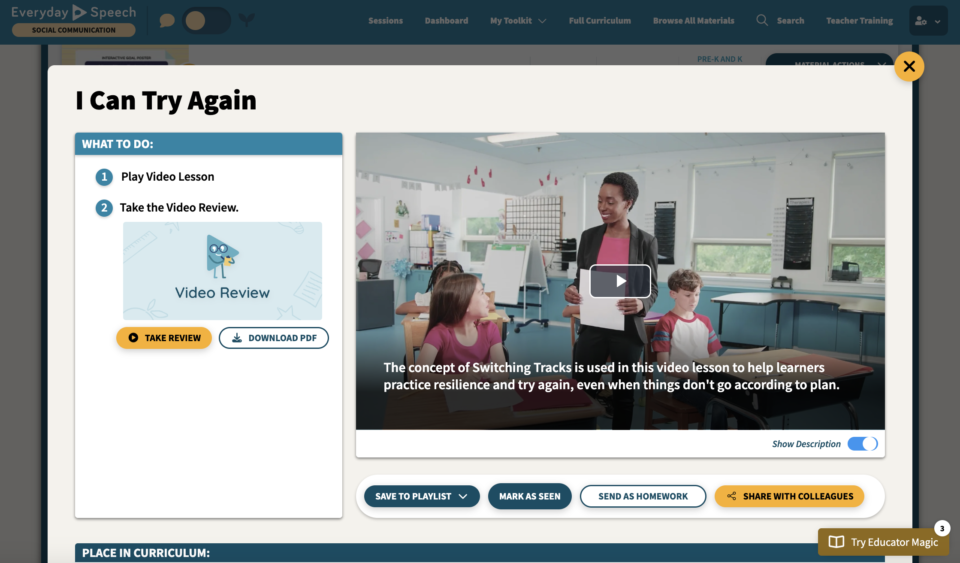
Vocational education is about more than just job-specific skills—it’s about preparing students for life beyond the classroom. Whether it’s working in a collaborative team, communicating effectively with supervisors, or navigating social dynamics in the workplace, social communication skills are crucial for success. For many vocational students, developing these soft skills can be just as challenging as mastering technical abilities. This is where a structured approach to social-emotional learning (SEL) can make a significant difference.
The Everyday Speech Social Communication Curriculum is a resource designed to address these challenges by helping students build the social communication skills they need to thrive in the workplace and beyond. In this post, we’ll explore why this curriculum is a valuable tool for vocational teachers and how it can fit seamlessly into your classroom.

Why Social Communication Skills Are Essential in Vocational Education
Vocational education prepares students for specific careers, but soft skills—like communication, collaboration, and problem-solving—are often what makes the difference between success and failure in the workplace. Research from the National Soft Skills Association shows that 85% of job success comes from having well-developed people skills, while only 15% is attributed to technical knowledge.
For students who may struggle with social communication due to learning differences, autism spectrum disorder (ASD), or other special needs, these skills don’t always come naturally. This is where a curriculum that explicitly teaches social communication can be incredibly beneficial.
Key Benefits of Teaching Social Communication Skills in Vocational Education:
- Helps students navigate workplace expectations and norms
- Equips students to handle social interactions and conflicts professionally
- Fosters teamwork and collaboration skills that are essential in most careers
- Prepares students for real-world challenges beyond the classroom
Everyday Speech: A Practical Curriculum for Vocational Students
The Everyday Speech Social Communication Curriculum offers a structured way to teach social communication skills that vocational students can apply in the real world. Here’s how it can work in your classroom:
1. Comprehensive and Flexible Curriculum
Everyday Speech provides a full scope and sequence of lessons covering various aspects of social communication, such as understanding nonverbal cues, problem-solving in social situations, and assertive communication. This means you don’t need to start from scratch when planning lessons—everything is already laid out for you, with room for customization based on your students’ needs.
The curriculum is designed to be flexible, so you can adapt lessons to suit the specific contexts of your vocational program. For example, if you’re teaching a culinary arts course, you might focus on lessons that involve teamwork in the kitchen, customer interactions, or communication with supervisors. If you’re working in a healthcare program, you can emphasize communication with patients, handling stressful situations, or working within a medical team.
2. Engaging, Real-World Scenarios
Vocational students often benefit from hands-on, practical learning experiences. The Everyday Speech curriculum incorporates video modeling, role-playing activities, and real-world scenarios that make abstract concepts more concrete.
For instance, lessons may include watching a video of a workplace interaction, followed by group discussions and role-playing exercises. These activities help students not just understand what they need to do, but also practice how to apply these skills in a variety of professional settings. This kind of experiential learning is particularly beneficial for vocational students, who often learn best by doing.
3. Support for Diverse Learners
Vocational classrooms are often diverse, with students coming from different backgrounds and with varying needs. Everyday Speech is designed to support all learners, including students with learning differences, ASD, or social anxiety. The curriculum is structured but adaptable, allowing teachers to modify lessons to meet individual needs without losing the core objectives.
The research-based content ensures that students are learning skills that are not only effective but also relevant to their real-world experiences. The curriculum’s built-in assessment tools help teachers monitor progress and adjust instruction as needed, ensuring that every student can grow in their social communication abilities.
4. Practical Tools for Teachers
Everyday Speech also offers resources and support for teachers. Lesson guides, video tutorials, and access to a community of educators provide practical tools that make it easier to integrate social communication lessons into your vocational program. Whether you’re new to teaching social communication or have years of experience, these resources are there to help you along the way.
How Everyday Speech Can Fit into Your Classroom
One of the most important aspects of any curriculum is its usability in a busy classroom. Everyday Speech is designed to be easy to implement. Here are a few ways it can fit into your vocational program:
Progress Tracking: Everyday Speech includes built-in tools to help you track student progress, so you can see how your students are improving over time and make adjustments as needed..
Flexible Scheduling: Lessons can be adapted to fit within your existing schedule, whether you teach in block periods, rotating classes, or shorter daily sessions.
Cross-Curricular Integration: Social communication skills can be woven into your regular vocational lessons. For example, when teaching automotive technology, you can incorporate lessons on customer service and teamwork.
Ready to Explore the Curriculum?
If you’re interested in learning more about how the Everyday Speech Social Communication Curriculum can support your vocational students, check out the sample page.
By integrating social communication lessons into your vocational classroom, you’re helping your students develop the skills they need to succeed not just in their chosen careers, but in life.
Sign up for your free trial today – no credit card required!
Access the full Social Communication Curriculum HERE!
Instant access to thousands of no-prep social skills activities, over 1000+ video lessons, and engaging games designed to enhance learning and development.
Related Blog Posts:
Teaching Middle School Students to Stay Calm and Solve Problems
Understanding Social-Emotional Learning: A Guide for Parents and Educators
Pragmatic Language: Enhancing Social Skills for Meaningful Interactions






